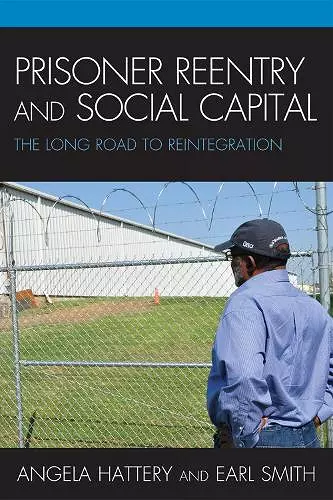Prisoner Reentry and Social Capital
The Long Road to Reintegration
Angela J Hattery author Earl Smith author
Format:Hardback
Publisher:Lexington Books
Published:2nd Jun '10
Currently unavailable, and unfortunately no date known when it will be back
This hardback is available in another edition too:
- Paperback£45.00(9780739143896)

"If you do the crime you gotta do the time." This adage reflects the overall attitude most Americans have about crime and the criminal justice system. Implicit in this adage is the notion that once "the time" is done, the individual is free to re-enter society and resume a normal life. In Prisoner Re-entry and Social Capital, authors Earl Smith and Angela J. Hattery challenge this myth. Prisoner Re-entry and Social Capital takes as its starting point interviews with twenty-five men and women during the summer of 2008 about their experiences with re-entering the "free world" after a period of incarceration. By analyzing the experiences of these men and women, Smith and Hattery look in depth at the factors that inhibit successful re-entry and illustrate some successes and failures. The book examines individual characteristics that inhibit successful re-entry such as addiction and sex offender status as well as the unique challenges faced by women. Uniquely, Smith and Hattery focus on the role that social capital plays as one of the most important factors that shapes the re-entry experience. Today, one of the most pressing issues facing scholars, those who work in the criminal justice system, and the citizenry as a whole is the extraordinarily high rate of recidivism. These interviews and analyses provide a deeper and more precise understanding of the biases faced by re-entry felons in the labor market and work to address the key barriers to re-entry in hopes to aid in their elimination.
As an African American man who spent nearly 19 years in prison for a crime I did not commit, Hattery and Smith's book resonates powerfully with me. Their focus on the struggles that men and women coming home from prison face as they attempt to rebuild their lives is very important. Based on interviews with the men and women enrolled in the "Homecoming Program" of the Darryl Hunt Project for Freedom and Justice, Hattery and Smith's analysis goes beyond the usual discussion of securing a job and stable housing and focuses on the process of rebuilding relationships and reconnecting with family, both of which are critical to successful reentry. They highlight the struggles faced by women who give birth while incarcerated as well as the special case of wrongful conviction and incarceration. Their policy recommendations seek to strengthen the work of reentry programs and the lifting of social welfare bans that block reentry. -- Darryl Hunt, 152nd exonoree, founder of the Darryl Hunt Project of Freedom and Justice
Prisoner Reentry and Social Capital is an outstanding look at the workings of race, gender, and disadvantage in recidivism. Perhaps the most significant contribution of this work is the voice it provides for men and women returning home from prison. Smith and Hattery masterfully use the words of reentry felons in sketching the myriad of complexities (personal and structural) in creating a new life after prison. By bringing attention to how these vulnerable populations navigate their prickly support networks in efforts to find stable employment, housing, and overcome addictions, we gain a deeper appreciation of barriers to reentry. In addition to portraying the challenges of reentry, this work also illuminates how those returning home use social capital to successfully maneuver the 'free world.' This is an important work for anyone interested in prison reentry. -- John Eason, Arizona State University
Smith and Hattery's book on prisoner re-entry and social capital is of societal-wide interest to criminologists, policymakers, prisoners and their families, community workers, and just ordinary folk who want a better understanding of the problem of revolving-door criminality. The authors discuss the practical matters that can serve as barriers to, as well as avenues for, change to a healthy and socially productive life for former convicts and their communities. With social capital—employment, housing, support networks, supervision, drug and sexual offense rehab—we can greatly reduce the expense and tragedy of recurring crime. Smith and Hattery offer a unique examination, through a series of revealing interviews with ex-prisoners shored up by inarguable data analysis and an historical background of failed policies, of a wasteful but imminently fixable social problem. -- Bonnie Berry, Social Problems Research Group
In this empirical report, Angela Hattery and Earl Smith, both from Wake Forest University, report on interviews they conducted in the summer of 2008 with 25 men and women recently released from incarceration in North Carolina. In this study, they focus on 'the colossal barriers to reentry.' Many of the findings reported herein are not surprising. They confirm previous studies, for example, that both employment and housing are key factors in successful reentry. But this report emphasizes the role of “social capital” for successful reentry. * Journal of Community Corrections *
ISBN: 9780739143889
Dimensions: 241mm x 162mm x 17mm
Weight: 431g
166 pages